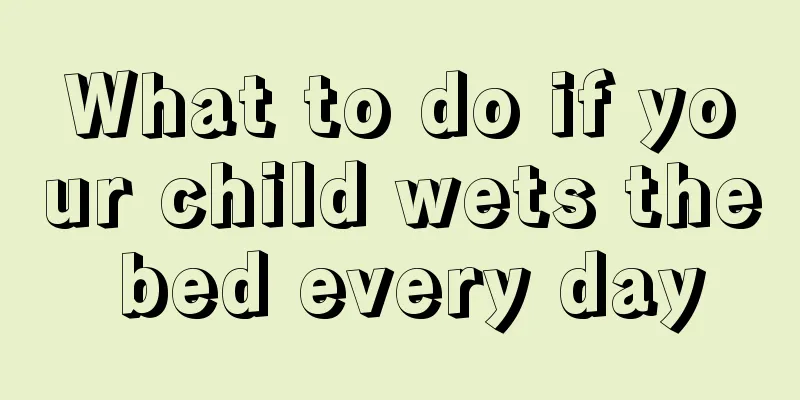What to do if your child wets the bed every day

|
There are many children who wet the bed every day. When they are young, they wet the bed because they cannot control their urination. As they grow older, they gradually gain the ability to control their urination. If a child wets the bed every day, it may be that some adverse reaction has occurred, which requires parents to pay special attention. So what should you do if your child wets the bed every day? Let's introduce it in detail below. measure: 1. Behavioral therapy: Starting from the first day of treatment, parents are required to set up a schedule for their children. When the child wets the bed, they should find out the factors that cause the bedwetting and record them, such as not going to bed on time, being too excited before going to bed, being too excited during the day, consuming too much fluid in the evening, etc. When there is no bed-wetting, draw a star on the schedule and give verbal praise or material rewards. 2. Bladder function training: urge the child to drink more water during the day and try to extend the interval between urinations to increase urine output and gradually increase bladder capacity. Encourage the child to stop urinating in the middle of urination, count from 1 to 10, and then empty the urine to improve the control ability of the bladder sphincter. 3. Establish conditioned reflex: From the beginning of treatment, parents are required to use an alarm clock to wake up the child half to one hour before the time when the child often wets the bed at night, and get up to urinate. And encourage the child to go to the toilet to urinate by himself, so that the child can excrete urine in a relatively sober state. How old can a baby stop using diapers? 1. In fact, the earlier you change your baby's diaper, the earlier he will learn to get rid of diapers. At the same time, if the baby is older and still wears diapers all day, he may learn to hold his urine later than babies who do not wear diapers. Although children cannot completely learn to urinate and defecate independently before the age of 2 or 3, they can develop good habits of urination and defecation. Before the age of one and a half, especially before the age of one year, try to use diapers so that the baby can urinate and defecate as he pleases without causing psychological burden and can sleep well. 3. After one and a half years old, you can try to remove diapers during the day and train your child to urinate in the potty or toilet. Diapers are still needed at night. As the child's ability to control urine improves, you can gradually remove the night diapers. In many cases, children's bedwetting is not caused by a physical disease, but an individual phenomenon caused by their habitual daily activity level or water intake. Therefore, when a child wets the bed, you can try the above methods to guide your child to develop the habit of not wetting the bed, and gradually reduce the number of bedwetting to avoid bedwetting. |
<<: What to do if your child's nose bleeds
>>: Is it normal for children to wet the bed occasionally?
Recommend
What is the reason why children urinate red urine?
I believe that many parents would be very scared ...
How to take care of children’s teeth?
Having healthy teeth is very important for people...
How long does it take for a newborn's skin to turn white?
I believe many people have had this experience: w...
How to treat laryngitis and cough in children?
It is normal for children to cough, but if the co...
What are the disadvantages of children eating ice cream?
Ice cream is a delicious snack that is very popul...
Symptoms of pinworm infection in children
It is easy for the human body to be infected with...
Is myocardial injury in children easy to treat?
I believe that the health of their children is wh...
What should I do if my baby has blue veins on the bridge of his nose? These methods deal with
Some mothers find blue veins on their baby’s nose...
How to take care of a baby girl's private parts
Girls' private parts are relatively private. ...
Are there any side effects to children's motion sickness medicine?
In life, some children suffer from motion sicknes...
What to do if your baby is breathing heavily
Whether a baby's breathing is heavy depends o...
What to do if baby has bloating
The health of babies is very important to every p...
Why does my baby have a fever and a lot of eye mucus?
Many babies have a lot of eye mucus when they hav...
What should I do if my child has a stroke?
Stroke is a very common phenomenon. It is more co...
Why do 13-year-old girls have underdeveloped breasts?
Generally, girls start to develop breasts between...









